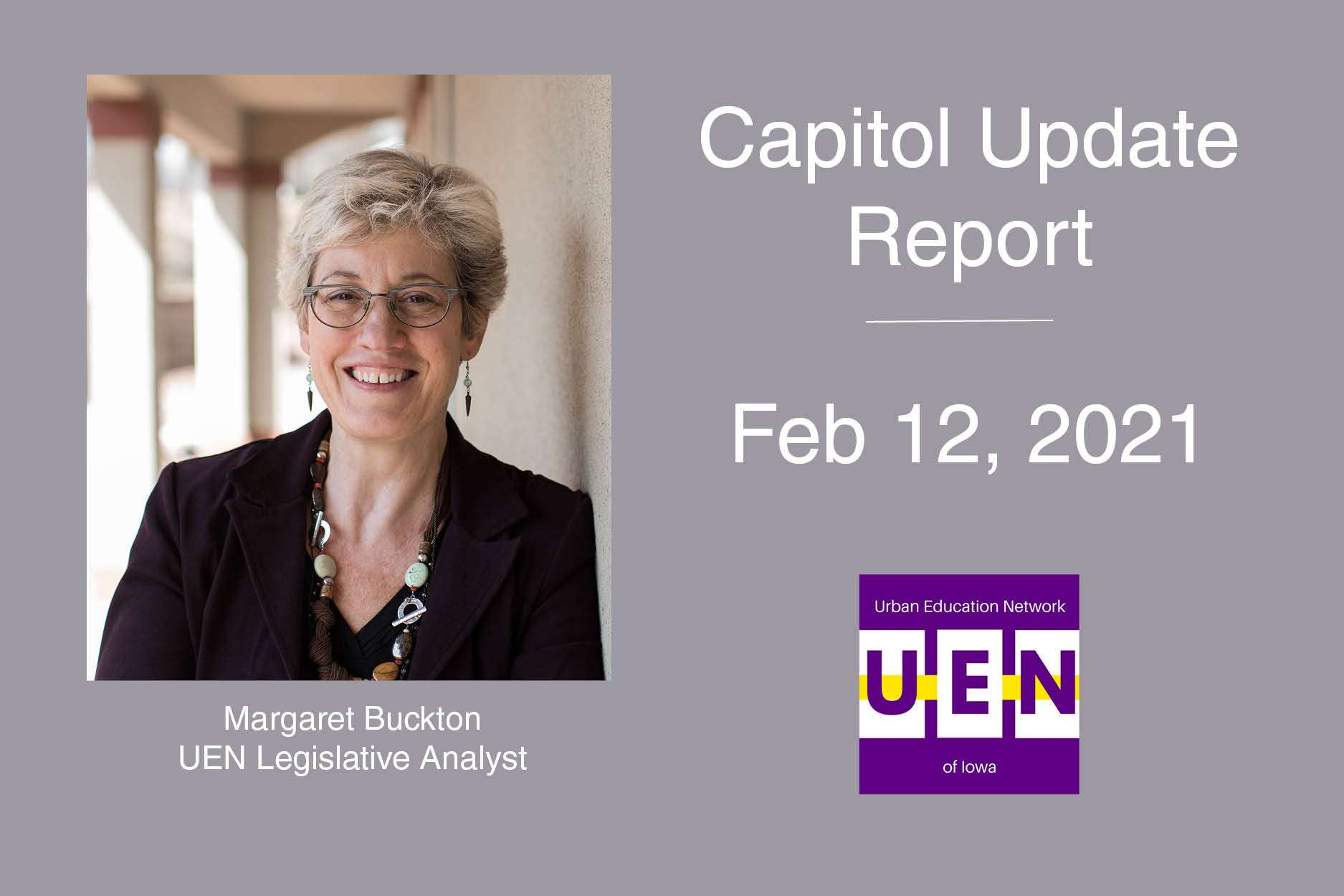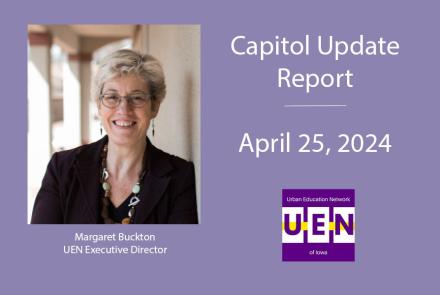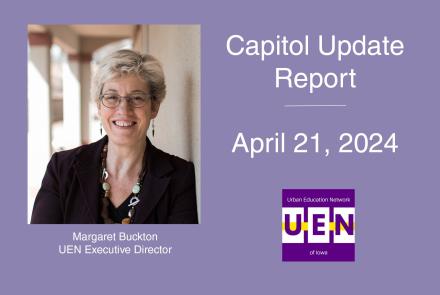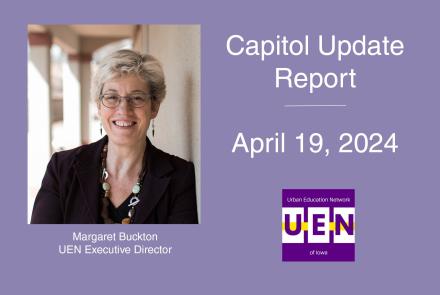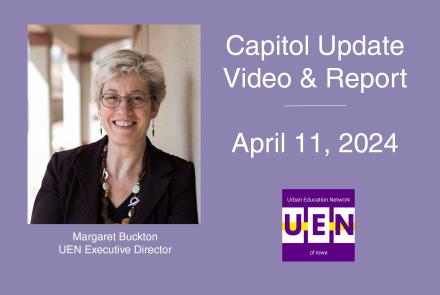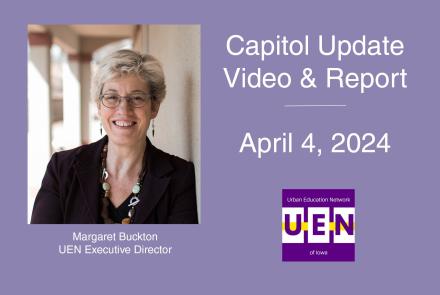Capitol Update - February 12, 2021
UEN Legislative Update
February 12, 2021
In this UEN Weekly Report from the 2021 Legislative Session, find information about:
- School Funding Compromise Reached at 2.4%
- Comparison of SSA and One-time House and Senate Proposals
- Voucher Highlight: The ESSA List Schools and Graduation Rates
- Bills Receiving Action This Week
Download the full Capitol Update Report for February 12, 2021
School Funding Action This Week:
In the Senate, SF 269 School Funding, sets a 2.2% increase in SSA, closes the equity formula gap by $15 per pupil, bringing the state cost per pupil up to $7,218 combined. The bill also provides a slightly higher amount to transportation equity growth ($768,000). The Senate also provides a $65 per pupil one-time payment for districts who were completely in compliance with return-to-learn requirements when school opened last Fall (which would exclude only Des Moines at a $2.1 million shortfall compared to other districts.) The Senate approved the bill on Tuesday and sent it to the House. UEN is registered opposed.
In the House, HF 438 School Funding, sets a 2.5% increase in the state cost per pupil and closes the equity gap by $10 per pupil, bringing the state cost per pupil up to $7,239. The House Education Committee approved the bill, sending it to the House Calendar. UEN is registered as undecided on this bill. It falls short of the UEN’s 3.75% increase request, but is better than the Senate.
Agreement: In Thursday evening debate, Rep. Dolecheck announced the agreement. The House amended their bill set a 2.4% increase in the SSA (compromise), close the formula equity gap by $10 per pupil (House language), provided additional funds necessary to transportation to bring all districts down to the state average ($768,000) (Senate language) and continued the property tax relief payments, freezing the local contribution to the additional levy at $750 per pupil (contained in both proposals). The amendment also deleted the Senate’s provision of $65 per pupil one-time qualified instruction payment, which is expected to be part of the House discussion on HF 439 Qualified Instruction Payment, currently in the House Appropriations Committee. The House approved the House Amendment H-1043, and then the bill as amended was approved, 56:36 with 8 absent or not voting sending the compromise back to the Senate. The Senate is expected to consider it on Monday, Feb. 15, which is the 30-day deadline for setting SSA following the release of the Governor’s budget.
Good News this Week: During the Senate debate on funding, Sen. Sinclair, Chair of the Education Committee, shared these statistics about Iowa’s public education system achieving at a high level. She said, Iowa schools are:
- # 1 in the nation in graduation rate
- In the top 3 in ACT scores (for those states that test more than 50% of students)
- Increasing ACT participation as more students took the ACT in 2020, despite COVID closure
- #1 in concurrent enrollment/college credits per capita in the nation
Fiscal Impact of SSA Proposals: The following table is a comparison of the two chamber proposals, with the known provisions included in the House amendment highlighted or indicated below (other numbers will be updated when the Fiscal Note is published.)
|
|
SF 269 SSA + One-time In-Person Supplement |
|
HF 438 SSA & HF 439 One-time In-Person Learning Bonus |
|
House Amendment |
|
SSA rate |
2.2% |
|
2.5% |
|
2.4% |
|
SSA increase per pupil |
$155, which is a total of $7,203. The $15 per pupil DCPP equity brings SCPP to $7,218 |
|
$176, which is a total of $7,224. The $10 per pupil DCPP equity brings SCPP to $7,234 |
|
$169, which is a total of $7,217. |
|
Property Tax Replacement Payment |
Increase of $11 million, bringing total to $86.1 million and increasing the PTRP per pupil amount of $152 |
|
Increase of $12.1 million, bringing total to $87.2 million and increasing the PTRP per pupil amount of $154 |
|
|
|
Categorical increase |
Increase of $7 million, bringing total to $559.8 million |
|
Increase of $8.1 million bringing the total to $560.9 million |
|
|
|
Preschool |
Decrease of $7.5 million, for a total of $80.5 million |
|
Decrease of $7.3 million, for a total of $81.0 million |
|
|
|
Budget Guarantee |
141 districts for a total of $28.6 million (increase of $20.4 m) |
|
135 districts for a total of $25.9 million (increase of $16.1 m) |
|
140 districts at $27.6 million |
|
AEA funding |
Continues $7.5 million statutory reduction. Current law assumes $15 million cut is restored. |
|
Continues $7.5 million statutory reduction. Current law assumes $15 million cut is restored. |
|
|
|
Formula Equity per Pupil |
$15 per pupil for a total of $8.7 million |
|
$10 per pupil for a total of $5.8 million |
|
Brings SCPP up to $7,234 |
|
Transportation Equity |
Appropriation of 768,000 (total of $27.5 million) |
|
$667,000 (increase of 2.5% on last year’s amount, for total of $27.4 million.) |
|
|
|
Qualified Instruction Funding Supplement |
$65 for all districts except DMPS, for a total of $29.4 million) It would cost an additional $2.1 million to include DMPS. |
$29 million |
Contained in HF 439: $30 million total appropriation prorated based on # of days that exceed 6 hours offered to all students. Hybrid days exceeding 6 hours count for half. Based on entire district, not individual buildings. |
$30 million |
Removed the $65 per pupil from SF 269 by House Amendment. Will consider with SF 439. |
|
Funding Details |
SSA $35.8 million includes PTRP, Formula Equity, categoricals, cut to PK and restoration of $15 million to AEAs. Add .8 for transportation |
$21.6 million
|
SSA $46.1 million includes transportation, PTRP, Formula Equity, categoricals, cut to PK and restoration of $15 million to AEAs |
$31.1 million |
|
|
Total State Funding |
|
$50.6 million |
|
$61.1 million |
|
The Qualified Instructional Funding Supplement (Bonus for In-person Instruction):
The House’s one-time in-person learning bill, HF 439, appropriates $30 million to the Department of Management to distribute to schools on a prorated basis for every full-time school day that the school provided a full-time in-person learning option to all students. The chair during the subcommittee explained the House’s intent to provide support to schools for the extra costs of providing full-time instruction that districts with virtual or hybrid instruction may not have incurred. The bill requires school districts to report their count of instructional days to DOM within 14 days of the Governor’s signature.
Definition of qualified instruction: the bill defines full time as 6 hours, allows a day less than 6 hours but more than 3 hours to count for half a day, allows schools offering hybrid instruction to count 6 hour days as half days for purposes of proration, for any day offered between Aug. 23 and Jan. 31.
Concerns: the bill does not have a provision for counting hybrid days with fewer than 6 hours of instruction. The formula does not recognize that most districts comply with calendar requirements based on hours of instruction rather than days. Many districts, rural, suburban and urban alike, had times when their elementary school was full-time in-person, their middle school and/or high school were hybrid. The bill doesn’t provide any direction in providing resources based on partial in-person full-time instruction. The bill also does not fairly treat districts on trimesters who have more days in the second half of the year, districts that started late or offered virtual learning due to the Derecho storm damage, or districts that were awarded a waiver from in-person instruction due to elevated COVID positivity rates and staff shortages.
Advocacy Messages for House Appropriations Committee on the Qualified Instruction Funding Supplement:
- This bill has good intentions. Urban schools appreciate $30 million in additional resources.
- The intricate exercise of figuring out the days and hours that would qualify and the winners and losers from the outcome conflict with our core principles: 1) local school boards should have the authority to and will make the best decisions for their communities and students and 2) all students should have a great Iowa education regardless of their zip code.
- All districts had increased costs for in person instruction, hybrid instruction and virtual instruction in order to best accommodate student needs and public safety.
- SF 2310 required school districts to consider CDC and local public health guidelines in determining their return to learn plans and all districts have compliant and approved return-to-learn plans.
- This money would be best distributed through the formula, which achieves those equity and local control principles in addition to lowering budget guarantee property taxes. If funding must be one-time, it should be distributed per pupil.
House Appropriations Committee Members; 13 of 25 representing UEN member districts, here: https://www.legis.iowa.gov/committees/committee?ga=89&groupID=695
Voucher Highlight: The ESSA List Schools and Graduation Rates:
Students First Scholarships (AKA Vouchers) in SF 159 would be available to students entering kindergarten or having attended the prior two semesters in a school on the ESSA list, labeled as Schools in Need of Comprehensive Support and Improvement. These 34 schools are identified as Iowa’s bottom 5% based on test scores from 2018 and 2019 on two different tests, with no test in 2020 due to the COVID closure. Of the 34 schools, 13 have made enough improvement to move off the list at the next opportunity, but all districts regardless of improvement, retain the ESSA label for 3 years. If 13 schools come off the list, 13 more will go on. It must always be at least 5% of Iowa schools. Looking closely at the 34 schools reveals the following:
- 25 have more than 60% FRPL (highest 94.2%) compared to the state average of 41%
- 11 have more than 10% ELL (highest 57.9%) compared to the state average of 6.5%
- 23 have above average IEP % (highest 26.7%) compared to the state average of 12.9%
- 12 have diversity plans
- Half (17) are urban and half (17) are rural
- Average graduation rate is 87.3% (4 have 100% and 10 are above the state average of 91.4%)
- If Iowa’s bottom 5% comprised a state, they would tie for 24th in the nation in graduation rate.
- Being placed on the list is based on test scores, gaps between subgroups, the direction of the trend and being among the lowest 5% in Iowa. If all Iowa school districts improve, there is still a lowest 5%.
Some legislators have responded to advocacy messages that “this doesn’t impact your district so don’t worry about it.” All school leaders have concerns about who will be on the list next year and about the diversion of public funds to private schools.
Continued Advocacy Against Vouchers: although there appears to be less appetite in the Iowa House to move a voucher bill forward, keep talking to legislators about the damage to public schools. Be respectful and polite. The best lobbying is gentle persuasion applied relentlessly. Let your UEN staff know if you get a firm commitment from your House member regarding support or opposition to a stand-alone voucher bill if the policy were to gain traction. Key messages: Iowa has school choice with good private schools and public school open enrollment. Oppose public money for private schools, which are not accountable to taxpayers or transparent in either expenditures or outcomes. Private schools are not required to enroll all students. Once states initiate voucher programs, the experience is they expand.
Bills Receiving Action This Week:
SF 130 School Board Member Income Limit: this bill allows a school board member to earn more than the $6,000 limit in the conflict of interest statute if working in the district as a substitute teacher, bus driver or food/nutrition work during the 2020-21 school year. The bill was approved in the Senate 47-0. Companion HF 497 are both on the House Calendar. UEN is registered in support.
SF 183 Construction Manager-at-Risk: this bill allows a governmental entity to enter into a guaranteed maximum price contract for the construction of a public improvement and prohibits governmental entities from entering into design-build contracts. The LSA published a fiscal note which says the impact on local governments cannot be determined. UEN is registered as undecided. Please let us know if you have concerns. The bill was approved by the Senate, 28-19 and is now in the House State Government Committee along with companion bill HSB 55.
SF 224 Bathroom Bill: this bill would require individuals in schools to use a multi-use bathroom that aligns with the gender specified on their birth certificate. The bill is in the Senate Education Committee. The Subcommittee of Sens. Carlin, J. Taylor and Celsi moved the bill forward, 2:1, with Sen. Celsi declining to sign the report. UEN is registered opposed as the bill conflicts with federal civil rights law and would likely increase bullying against transgender students.
SF 285 Opportunity Scholarships: this bill allows the College Student Aid Commission to adopt rules to allow a student to suspend participation in the All-Iowa Opportunity Scholarship program for emergency reasons. The bill was approved by the Senate Education Committee. Companion bill HF 499 was approved by the House Education Committee. Both bills are on their respective calendars. UEN is registered undecided.
SF 286 Non-Profit Organization Reporting: this bill strikes the requirement for schools to include information on non-profit school organizations in which the school participates (such as UEN and RSAI) and strikes requirements for the DE to include such summary information in its reports. Companion HF 386 was approved in the House 94:0. UEN is registered in support.
SF 287 Education Funding Requests for Students in Placements: this bill changes how schools calculate funding requests to the DE for providing education services to children in foster care, juvenile detention or residential treatment facilities. See HF 317 was approved in the House 97:0. The bills are on the Senate Calendar. UEN is undecided.
SF 288 Teach Iowa Loans: this bill allows the use of funds from various discontinued teacher loan programs for the Teach Iowa loan program. Allows repayments for forgivable loans to be used for the Teach Iowa loan program. Makes technical changes. See HF 371. Both bills were approved in Education Committees and on their respective calendars. UEN is registered in support.
SF 289 School Powers: this bill raises the threshold for AEA leases needing state approval to $100,000, makes changes to the school board president terms regarding annual and organizational meetings, strikes requirements that school boards report dues paid to the Iowa Association of School Boards to the DE but requires boards to submit other reports that do contain that information, makes changes related to the sale of school buildings and property, including how funds are deposited, strikes newspaper reporting requirements for loans for equipment purchases, changes and strikes other reporting requirements on sales of property, and strikes mandated energy audits. SF 289 is on the Senate Calendar. Companion HSB 146 is in the House Education Committee. UEN is registered in support.
SF 294 Child Development Services: this bill strikes certain outdated duties of the Child Development Coordinating Council on inventories of services for at-risk children and the development of regional councils. Companion HF 388 was approved by the House, 94:0, and is attached to this bill on the Senate Calendar. UEN is undecided.
HF 105 Open Enrollment Transportation: this bill allows a receiving school district to send school vehicles into a sending district to provide transportation to students open enrolling into the receiving district without the sending district school board’s consent. A subcommittee of Reps. Bossman (C), Ehlert, and Sorensen is assigned. The bill is in the House Education Committee. UEN is registered in opposition.
HF 150 Sharing Special Education Director: this bill adds the special education director position to operational sharing, counting as the equivalent of 3 pupils. A subcommittee of Reps. Dolecheck (C), Bossman, and Winckler is assigned. UEN is registered as undecided.
HF 222 1619 Project Curriculum Penalty: this bill prohibits a school district from using any United States History Curriculum that in whole or in part is derived from a project by the NY Times knowns as the 1619 Program, or any similarly derived curriculum. The bill further sets a penalty of 1/180th of school foundation formula funding for every day during which such curriculum was used. UEN provided testimony opposed to this bill as an infringement on local control and unprecedented enforcement mechanism of such a penalty. The appropriate mechanism for any enforcement of mandated standards and curriculum is the accreditation process. Subcommittee members Wheeler and Stone voted to move the bill forward to the full Committee. Rep. Smith did not. UEN is opposed to this bill.
HF 294 Telehealth Reimbursements (formerly HF 89): this bill requires reimbursements for telehealth services to be the same as in-person reimbursements. Prohibits a health carrier from requiring a health care professional to be in the same room as a person and defines terms. The bill was approved by the House Human Resources Committee and moves to the House Calendar. UEN is registered in support.
HF 308 Senior Year Plus Proficiency: this bill allows school districts to jointly adopt rules with community colleges on alternative requirements to show proficiency for a student to qualify for a community college concurrent enrollment course. Effective on enactment. The House approved the bill 94-0; it’s now attached to a similar bill, SF 262 on the Senate Calendar. UEN is registered in support.
HF 316 Open Enrollment Good Cause Definition: this bill makes changes to ensure that the district of residence paying the special education costs for an open enrolled student is the district receiving the state aid for the student. The House approved the bill 94-0; it is now assigned to the Senate Education Committee. UEN is registered in support.
HF 400 Substitute Teacher Requirements: this bill requires the substitute authorization issued by BOEE to allow an individual to substitute in grades PK-12 for no more than 10 consecutive days in one job assignment for a regularly assigned teacher who is absent, except in the driver’s education classroom, shall require not more than the successful completion of an associate degree or not more than 60 undergraduate semester hours, or the equivalent, from a regionally accredited institution. The Subcommittee of Reps. Goggle, Cahill, and Moore is assigned. UEN is registered in support.
HF 420 American Culture Curriculum: this bill encourages school districts and accredited nonpublic schools to incorporate, where reasonable and appropriate, in the curricula offered, elements or standards concerning or characteristic of American culture and civilization, including but not limited to genres of American music, including patriotic music; the contributions of the founding fathers; and the art and architecture of America, including monuments and the purposes of monuments erected in Iowa and throughout the country. A subcommittee of Reps. Thompson (C), Smith, and Stone is assigned. The bill is in the House Education Committee. UEN is registered in as undecided.
HF 470 School Activity Fund Costs: this bill allows the transfer of funds for a two-year limited period (FY 2022 and FY 2023 only) from the general fund or any other fund based on school board resolution, an amount necessary, as recommended by the superintendent, to fund co-curricular or extracurricular activities for which revenues from admissions, activity fees, student dues, student fundraising events, or other student-related co-curricular or extracurricular activities fail to meet the financial needs of the activity. The bill is repealed on July 1, 2023. The bill was approved by the House Education Committee and is on the House Calendar. UEN is registered in support.
Connecting with Legislators: Find biographical information about legislators gleaned from their election web sites on the ISFIS site here: http://www.iowaschoolfinance.com/legislative_bios Learn about your new representatives and senators or find out something you don’t know about incumbents.
Find out who your legislators are through the interactive map or address search posted on the Legislative Website here: https://www.legis.iowa.gov/legislators/find
To call and leave a message at the Statehouse during the legislative session, the House switchboard operator number is 515.281.3221 and the Senate switchboard operator number is 515.281.3371. You can ask if they are available or leave a message for them to call you back.
Advocacy Resources: UEN recently launched a new website. More tools and resources will be added, but go to www.uen-ia.org to find Advocacy Resources such as Issue Briefs, UEN Weekly Legislative Reports and video updates, UEN Calls to Action when immediate advocacy action is required, testimony presented to the State Board of Education, the DE or any legislative committee or public hearing, and links to fiscal information that may inform your work. The latest legislative actions from the statehouse will be posted at: www.uen-ia.org/blogs-list. Check out the new UEN Advocacy Handbook linked here, and also available from the subscriber section of the UEN website
Thanks to our UEN Corporate Sponsors: Special thank you to your UEN Corporate Sponsors for their support of UEN programs and services. You can find information about how these organizations may help your district on the Corporate Sponsor page of the UEN website at https://www.uen-ia.org/uen-sponsors.
|
|
Contact us with any questions, feedback or suggestions to better prepare your advocacy work:
Margaret Buckton
UEN Executive Director/Legislative Analyst
margaret@iowaschoolfinance.com
515.201.3755 Cell


